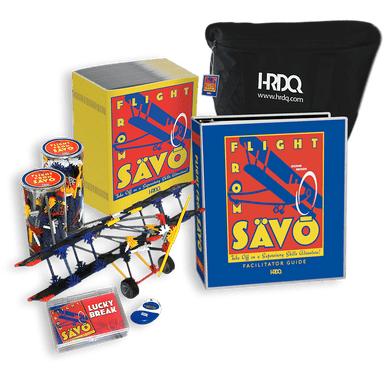
Supervisors are the vital link between an organization and its employment groups. They have key competencies and proficiencies that set the tone for the workplace. If someone is a good supervisor, they can perform their job more efficiently and gain more respect from their peers and subordinates. HRDQ's supervisory training programs and courses help supervisors get up to speed quickly. Explore our wide range of self-assessments, interactive games, and instructor-led programs that target every aspect of proficient supervision.
Supervisory Skills Questionnaire is a combination of assessment, peer feedback, a workbook, and a half-day supervisory skills training program that equips supervisors with the skills they need to tackle the everyday challenges they face in the workplace.

Leader-Manager Profile enables both your managers and your organization to achieve success. The 36-item assessment illustrates for managers how their competence as both a manager and a leader can contribute to meeting the demands of the marketplace.

The Toughest Supervisor Challenges gives both new and experienced managers the supervisory skills, tools, and techniques they need to evaluate every tough situation. They will learn the proper recourse to take with problem employees to resolve problems, create goals, work through personal issues, and mediate conflict.






Staying Connected with a Dispersed Workforce Today's workforce is spread all over the globe. No longer is everyone under one roof, and the benefits are.
from $599.00 Quick view
Forging a Successful Relationship with Your Supervisor The reality of today's workplace is that individual success depends not just on how well you do your.
from $599.00 Quick view
The Toughest Supervisor Challenges and How to Overcome Them There are no quick fixes to issues like employee performance, personality clashes, and conflict. Successful supervisors.
from $599.00 Quick view
Techniques and Tools for the New Manager Often, managers have all the strengths they need to succeed in the job – except the ability to.
from $599.00 Quick view
Develop Effective Supervisor Communication Skills for Better Performance Being a supervisor means taking on a lot of responsibility. Leaders need to be able to delegate.
from $599.00 Quick view
How to Successfully Integrate New Employees Introductions to company processes and policies are necessary when bringing in a new hire, but there are some onboarding.
from $599.00 Quick view
How to Encourage Success and Curtail Issues in Performance For organizations to achieve their goals, managers need to create a work environment that helps employees.
from $599.00 Quick view
Strengthen Commitment by Discovering the Motivational Needs of Millennial Employees More than one in three employees in today's workforce is a Millennial. Just like Boomers.
from $599.00 Quick view
Keep Employees Motivated and Challenged A Gallup poll reported that 70% of workers are not engaged at work – a very large percentage. Having engaged.
from $599.00 Quick view years in business training resources million trained
Supervisory Skills Questionnaire is a combination of assessment, peer feedback, a workbook, and a half-day supervisory skills training program that equips supervisors with the skills they need to tackle the everyday challenges they face in the workplace.
Leader-Manager Profile enables both your managers and your organization to achieve success. The 36-item assessment illustrates for managers how their competence as both a manager and a principal can contribute to meeting the demands of the marketplace.
The Toughest Supervisor Challenge gives both new and experienced managers the supervisory skills, tools, and techniques they need to evaluate every tough situation. They will learn the proper recourse to take with problem employees to resolve problems, create goals, labor through personal issues, and mediate disagreement.
Imagine you're a craftsman, armed with all the tools but uncertain how to use them masterfully. Supervisory skills training acts as your personal craftsman's workshop. These trainings are meticulously crafted to equip you with the competencies and tools needed to navigate the intricate landscape of supervision. From proficient interaction to conflict resolution, each module is tailored to enhance your skills as a supervisor.
But why is this crucial? Well, let's break it down. As a supervisor, you're not merely overseeing tasks; you're managing a crew. And let's face it, people are not always as predictable as the North Star. Supervisory training programs provide you with a versatile toolkit, ensuring you're prepared for any storm. It's like having a toolbox, but instead of wrenches and hammers, you're armed with proficient communication skills and conflict resolution techniques.
Supervisors will gain the knowledge and resources they need to react to events quickly and effectively during a successful supervisor skills training program. Supervisors should, ideally, undergo instruction on both managing staff and relevant federal and state legislation.
Supervisory training programs provides supervisors with the opportunity to learn about their roles within the company, communicate operationally, resolve issues, and advance their understanding of human behavior. Participants in these classes are also taught how to handle complaints and effectively discipline when needed.
Using effective written and verbal skills, fostering a positive work environment, boosting decision making skills, and efficiently planning and prioritizing work schedules are all common objectives of supervisory skills training.

A supervisor is anyone who is responsible for the work of others. This person is familiar with the daily employment of their staff and receives direction from those who make bigger decisions for the company. There are 10 essential competencies that supervisors should possess in order to do their jobs as successfully as possible. These skills can be mastered with supervisory training.
Every business has a significant demand for capable supervisors. Professionals with supervisory skills training certificates have a bigger advantage over their competitors in the sector. Go through the list of lectures for supervisory skills traiining and ask for further details.
Advanced guidance delves into the nuances of productive supervision, equipping individuals with the proficiencies to lead with confidence and make an impact.
Leaders often stand at a crossroads where decisions shape destinies. Training programs hone strategic decision-making skills, ensuring supervisors make informed choices that resonate with organizational goals.
The professional landscape is a fluid entity. Training programs instill adaptability, empowering individuals to navigate change seamlessly and emerge stronger.
Innovation fuels progress. Advanced guidance fosters a culture of innovation, encouraging supervisors to think beyond conventional boundaries and pave the way for transformative solutions.
A growth mindset is the cornerstone of continuous maturation. Training programs nurture this mindset, fostering a commitment to lifelong learning and improvement.
Education, assistance, and administration are the basic duties of a supervisor. The fundamental goal of supervisor training is to improve the relevant skills.
Supervisor instruction is often created to assist supervisors in learning the proper methods and approaches to assist them in motivating employees to succeed and reach their potential.
To encourage the best possible performance, supervisors must be able to motivate their staff, support new and innovative ideas, and sustain positive working relationships. As a result, supervisors are crucial in regulating workload.
In today's work environment, having a strong set of supervisory skills is respected and demanded.
Proficient Communication
Learn the art of conveying your thoughts clearly, fostering an environment of open interaction within your team.
Strategic Decision Making
Hone your decision making capabilities, ensuring that every move contributes to the overall success of your task force.
Conflict Resolution Techniques
Master the competencies to diffuse tensions and navigate disputes, turning challenges into opportunities for growth.
Team Building and Dynamics
Understand the dynamics of squad synergy, creating a harmonious and productive working environment.
Change Management
Equip yourself with skills that allow you to adapt to ever-changing circumstances, leading your squad with flexibility.
Frontline supervisors will acquire the knowledge and experience they need to succeed in their positions through the training programs. Even experienced supervisors can learn new management techniques to help them build their task force and meet their personal and professional objectives.
Supervisory training programs may be helpful for:
Emerging Leaders
Individuals poised to take on leadership roles or those who have been recently promoted can benefit from the skills and insights offered by training programs to navigate their new responsibilities successfully.
Mid-Level Managers
Those steering task forces and projects can leverage training programs to refine their supervision style, enhance decision-making skills, and foster a collaborative and high-performing team culture.
Experienced Executives
Seasoned professionals at the executive level benefit from staying ahead of industry trends, adopting innovative strategies, and maintaining a progressive supervisory approach.
Cross-Functional Teams
In an era where collaboration is paramount, cross-functional teams can enhance their collective efficacy through shared learning experiences, aligning their efforts towards common organizational objectives.
Individual Contributors with Leadership Aspirations
Even those not currently in formal supervisory roles but who aspire to climb the ranks can engage in supervisory training programs to prepare for future responsibilities.
Your organization's effectiveness is boosted when you advance the talents of your supervisors and employees; they acquire new skills, including productive communication, increased motivation, conflict resolution, and more.
Supervisory skills training allows supervisors to grow and learn how to employ their staff better. Training programs help supervisors develop core aptitudes and the ability to balance the sometimes-opposing demands of management and employees.
Communication is the cornerstone of supervision. Supervisors must master the art of conveying ideas, expectations, and feedback clearly and empathetically.
The corporate landscape is dynamic. Developing supervisors should cultivate adaptability and decisiveness to make informed choices that align with organizational goals.

A skilled supervisor knows how to harness the collective potential of a team. Fostering collaboration, motivating team members, and recognizing individual contributions are vital aptitudes.
Conflicts are inevitable in any team. A proficient supervisor is equipped with conflict resolution skills, ensuring that disputes are addressed promptly and constructively.
Rising above the day-to-day operations, supervisors must embrace strategic thinking. This involves aligning task force goals with broader organizational objectives and foreseeing potential challenges.
Explore the supervisory skills training programs available at HRDQ to advance your skills!
Frequently Asked Questions What is the importance of supervisory training?Supervisory training is important because it helps improve relevant skills and assists supervisors in motivating employees, maintaining positive working relationships, and regulating the workload. It also helps supervisors understand their roles, communicate effectively, resolve issues, handle complaints, and enhance decision-making and planning skills.
How long does it take to develop supervisory skills?The time frame varies, but with consistent effort and focused learning, individuals can see noticeable improvements in their supervisory skills within a few months.
What are the key skills required for a supervisor?The key skills required for a supervisor include excellent communication, conflict resolution, strong influence, critical thinking, time and priority management, diversity awareness, guidance, employee development, and interpersonal skills, and an openness to advice and learning.
Who benefits from supervisory skills training?Supervisory training programs are beneficial for supervisors, leaders, mentors, and individuals aspiring to become a supervisor or leader. The training helps enhance productive correspondence, motivation, accountability, conflict resolution, and otherskills necessary for successful supervision.
What role does emotional intelligence play in supervisory success?Emotional intelligence is paramount. Understanding and managing emotions, both one's own and others', enhances interpersonal relationships and decision-making.
How does supervisory skills training contribute to professional career prospects?Professionals with supervisory skills training have an advantage in the job market, as businesses across industries require capable leaders and supervisors. Supervisory training enhances career prospects by providing individuals with the expertise and knowledge needed for leadership roles.
Can supervisors be successful without formal training?Absolutely. Influential supervision relies on influence, collaboration, and earned respect. A title doesn't guarantee influence – actions and impact do.
HRDQ
827 Lincoln Ave #B-10
West Chester, Pennsylvania
19380
United States
610-279-2002